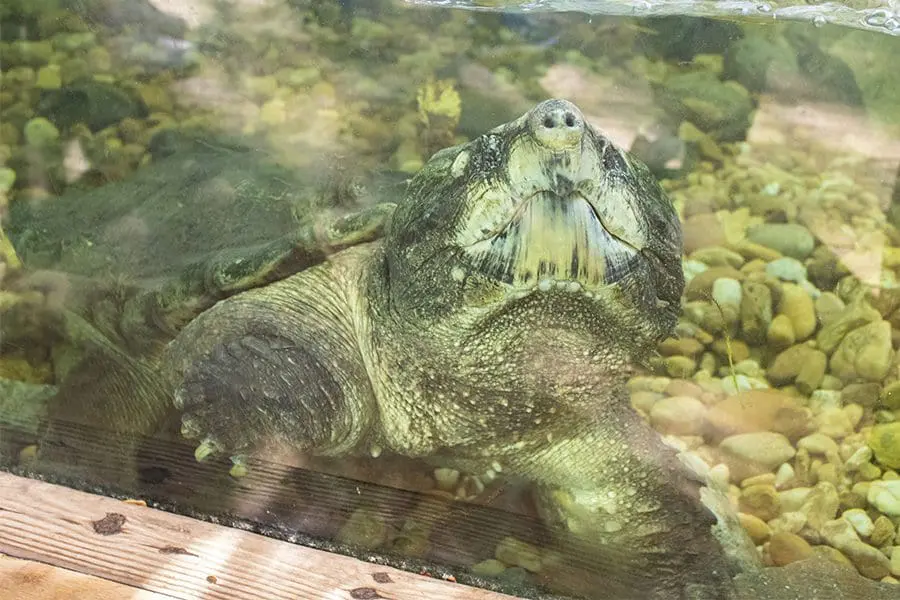

Come see this modern dinosaur on your next visit!
If you’ve meandered through our Wild Florida section recently, you may have come across an unfamiliar face (or one that our long-time Zoo supporters haven’t seen in a while). Now occupying the habitat that once belonged to our North American river otters is Capone, the 130-pound alligator snapping turtle.
Following the devastating loss of otters Gladys and Finley in early September, our animal care team had been working to identify the best possible use of their old home. Because Capone is such an extraordinary animal—and had been living behind the scenes for some time—we felt the best solution was to modify this habitat for him to enjoy a public-facing area.
“Because Capone is not quite as agile as the river otters were, his habitat received some small renovations,” said Animal Curator Zach Marchetti. “We turned the area into a pool refuge, which is the perfect spot for an alligator snapping turtle, as his species is perfectly adapted to spend their lives in the water.”
Rest assured that before taking on this “fixer upper,” we performed numerous tests on water, substrate and other sources in the area to eliminate the possibility of environmental factors in the death of our otters. “Following these tests and considering the distance in relation between otters and turtles, we have no concerns about the safety of this habitat for Capone,” said Zach.
Upon his arrival to the Zoo in 2009, Capone weighed 45 pounds and lived in what is now our Gulf Coast Box Turtle habitat at the entrance to Wild Florida. He rapidly outgrew this space and a custom pond was built in a behind-the-scenes area, where he was living until his recent move.
Some of our long-term Zoo guests would often ask us where Capone was, and while we could confidently say that he was living comfortably behind the scenes, we’re excited for guests to be able to see him and learn more about his unique species.
While we are not sure of his exact birth date, we estimate Capone to be a minimum of 55 years old, and potentially over 60! Alligator snapping turtles are one of the largest freshwater reptiles in the world and can live up to 100 years in their natural habitat. In addition to their pre-historic appearance, alligator snapping turtles are best known for their vermiform (or “worm-shaped”) tongue that they use to lure unsuspecting prey into their open jaws.
Alligator snapping turtles are listed as an imperiled species due to overhunting by people for food primarily in the 1960s and 1970s. Florida passed strong conservation laws in 2009 making it illegal to collect alligator snapping turtles and any turtle that resembles them. Still, it could take decades for the alligator snapping turtle to recover, according to the Florida Fish & Wildlife Conservation Commission.
Brevard Zoo is an independent, not-for-profit organization that receives no recurring government funding for our operating costs. Your generous support enables us to continue to serve our community and continue our vital animal wellness, education and conservation programs.
